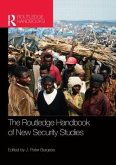The Mobility-Security Nexus and the Making of Order
An Interdisciplinary and Historicizing Intervention
Herausgeber: Hein-Kircher, Heidi; Distler, Werner
The Mobility-Security Nexus and the Making of Order
An Interdisciplinary and Historicizing Intervention
Herausgeber: Hein-Kircher, Heidi; Distler, Werner
- Broschiertes Buch
- Merkliste
- Auf die Merkliste
- Bewerten Bewerten
- Teilen
- Produkt teilen
- Produkterinnerung
- Produkterinnerung
The book explores the complex, multi-directional connections of the "mobility/security nexus" in the re-ordering of states, empires, and markets in historical perspective.
Andere Kunden interessierten sich auch für
![Critical Security Studies Critical Security Studies]() Columba PeoplesCritical Security Studies40,99 €
Columba PeoplesCritical Security Studies40,99 €![International Security Studies International Security Studies]() Peter HoughInternational Security Studies42,99 €
Peter HoughInternational Security Studies42,99 €![Translations of Security Translations of Security]() Trine Villumsen Berling (Denmark DIIS)Translations of Security58,99 €
Trine Villumsen Berling (Denmark DIIS)Translations of Security58,99 €![Reimagining Mobilities across the Humanities Reimagining Mobilities across the Humanities]() Reimagining Mobilities across the Humanities59,99 €
Reimagining Mobilities across the Humanities59,99 €![Handbook of Urban Mobilities Handbook of Urban Mobilities]() Handbook of Urban Mobilities51,99 €
Handbook of Urban Mobilities51,99 €![The Nexus of Practices The Nexus of Practices]() The Nexus of Practices63,99 €
The Nexus of Practices63,99 €![The Routledge Handbook of New Security Studies The Routledge Handbook of New Security Studies]() The Routledge Handbook of New Security Studies66,99 €
The Routledge Handbook of New Security Studies66,99 €-
-
-
The book explores the complex, multi-directional connections of the "mobility/security nexus" in the re-ordering of states, empires, and markets in historical perspective.
Produktdetails
- Produktdetails
- Routledge New Security Studies
- Verlag: Taylor & Francis Ltd
- Seitenzahl: 324
- Erscheinungstermin: 26. August 2024
- Englisch
- Abmessung: 234mm x 156mm x 18mm
- Gewicht: 504g
- ISBN-13: 9781032159874
- ISBN-10: 1032159871
- Artikelnr.: 71235257
- Herstellerkennzeichnung
- Libri GmbH
- Europaallee 1
- 36244 Bad Hersfeld
- gpsr@libri.de
- Routledge New Security Studies
- Verlag: Taylor & Francis Ltd
- Seitenzahl: 324
- Erscheinungstermin: 26. August 2024
- Englisch
- Abmessung: 234mm x 156mm x 18mm
- Gewicht: 504g
- ISBN-13: 9781032159874
- ISBN-10: 1032159871
- Artikelnr.: 71235257
- Herstellerkennzeichnung
- Libri GmbH
- Europaallee 1
- 36244 Bad Hersfeld
- gpsr@libri.de
Werner Distler is a political scientist, with a focus on peace and conflict studies. He works as researcher at the Center for Conflict Studies and the Collaborative Research Center "Dynamics of Security" at Marburg University, Germany. Heidi Hein-Kircher is a historian and the head of the Department Academic Forum at Herder-Institute on Historical Research on East Central Europe.
Part I: Introduction 1. Historizing the Mobility/Security Nexus:
Introductory Remarks Part II: Conceptual and Theoretical Reflections 2. The
Security/Mobility Nexus as an Analytical Lens: The Cases of
Counterterrorism and Infrastructure 3. Ordering Movement and Mobilizing
Security: On the Production of 'Critical Infrastructure' 4. Thresholds of
Threat in (Historical) Security Cultures: Overcoming the Good-Versus-Bad
Mobilities Dichotomy Part III: Case Studies Section 1: (Re)Ordering States
and Societies 5. Securitization as a Driving Force for Political
Mobilization of National Movements 6. State Order, Mobility, and Policing
in the Trust Territory of New Guinea. Patrolling the 'Periphery' 7. Spatial
(Im)Mobility as a Threat to Social Mobility: Roma in the Peripheries of
Rome and the NIMBY Politics of campi nomadi Section 2: (Re)Ordering Empires
8. Struggles with Mass-Migrations, National- and State-Interests in the
Late Habsburg Empire: Security through Mobility or against Mobility? 9.
Nineteenth-Century Labor Migration and Fear of Epidemics in the British
Colony of Mauritius (c. 1834-1910): A Danger to Public Health? 10. Securing
the Flows of Oil in a Transottoman Context: Baku's Oil, Infrastructures of
Transportation, and Mendeleev as an Imperial Expert of Securitization
(1850-1918) Section 3: (Re)Ordering Markets 11. Securitization Practices of
Traveling Merchants and Mercenaries (14th-17th century) 12. Anti-Nuclear
Activism, the State, and the Energy Market in the Federal Republic of
Germany: Mobilizing Power 13. 'Critical' Financial Infrastructures and the
Securitization of Calculative Micro-processes Part IV: Concluding Remarks
14. Security, Mobility, and the Colonial Connection: Concluding Remarks
Introductory Remarks Part II: Conceptual and Theoretical Reflections 2. The
Security/Mobility Nexus as an Analytical Lens: The Cases of
Counterterrorism and Infrastructure 3. Ordering Movement and Mobilizing
Security: On the Production of 'Critical Infrastructure' 4. Thresholds of
Threat in (Historical) Security Cultures: Overcoming the Good-Versus-Bad
Mobilities Dichotomy Part III: Case Studies Section 1: (Re)Ordering States
and Societies 5. Securitization as a Driving Force for Political
Mobilization of National Movements 6. State Order, Mobility, and Policing
in the Trust Territory of New Guinea. Patrolling the 'Periphery' 7. Spatial
(Im)Mobility as a Threat to Social Mobility: Roma in the Peripheries of
Rome and the NIMBY Politics of campi nomadi Section 2: (Re)Ordering Empires
8. Struggles with Mass-Migrations, National- and State-Interests in the
Late Habsburg Empire: Security through Mobility or against Mobility? 9.
Nineteenth-Century Labor Migration and Fear of Epidemics in the British
Colony of Mauritius (c. 1834-1910): A Danger to Public Health? 10. Securing
the Flows of Oil in a Transottoman Context: Baku's Oil, Infrastructures of
Transportation, and Mendeleev as an Imperial Expert of Securitization
(1850-1918) Section 3: (Re)Ordering Markets 11. Securitization Practices of
Traveling Merchants and Mercenaries (14th-17th century) 12. Anti-Nuclear
Activism, the State, and the Energy Market in the Federal Republic of
Germany: Mobilizing Power 13. 'Critical' Financial Infrastructures and the
Securitization of Calculative Micro-processes Part IV: Concluding Remarks
14. Security, Mobility, and the Colonial Connection: Concluding Remarks
Part I: Introduction 1. Historizing the Mobility/Security Nexus:
Introductory Remarks Part II: Conceptual and Theoretical Reflections 2. The
Security/Mobility Nexus as an Analytical Lens: The Cases of
Counterterrorism and Infrastructure 3. Ordering Movement and Mobilizing
Security: On the Production of 'Critical Infrastructure' 4. Thresholds of
Threat in (Historical) Security Cultures: Overcoming the Good-Versus-Bad
Mobilities Dichotomy Part III: Case Studies Section 1: (Re)Ordering States
and Societies 5. Securitization as a Driving Force for Political
Mobilization of National Movements 6. State Order, Mobility, and Policing
in the Trust Territory of New Guinea. Patrolling the 'Periphery' 7. Spatial
(Im)Mobility as a Threat to Social Mobility: Roma in the Peripheries of
Rome and the NIMBY Politics of campi nomadi Section 2: (Re)Ordering Empires
8. Struggles with Mass-Migrations, National- and State-Interests in the
Late Habsburg Empire: Security through Mobility or against Mobility? 9.
Nineteenth-Century Labor Migration and Fear of Epidemics in the British
Colony of Mauritius (c. 1834-1910): A Danger to Public Health? 10. Securing
the Flows of Oil in a Transottoman Context: Baku's Oil, Infrastructures of
Transportation, and Mendeleev as an Imperial Expert of Securitization
(1850-1918) Section 3: (Re)Ordering Markets 11. Securitization Practices of
Traveling Merchants and Mercenaries (14th-17th century) 12. Anti-Nuclear
Activism, the State, and the Energy Market in the Federal Republic of
Germany: Mobilizing Power 13. 'Critical' Financial Infrastructures and the
Securitization of Calculative Micro-processes Part IV: Concluding Remarks
14. Security, Mobility, and the Colonial Connection: Concluding Remarks
Introductory Remarks Part II: Conceptual and Theoretical Reflections 2. The
Security/Mobility Nexus as an Analytical Lens: The Cases of
Counterterrorism and Infrastructure 3. Ordering Movement and Mobilizing
Security: On the Production of 'Critical Infrastructure' 4. Thresholds of
Threat in (Historical) Security Cultures: Overcoming the Good-Versus-Bad
Mobilities Dichotomy Part III: Case Studies Section 1: (Re)Ordering States
and Societies 5. Securitization as a Driving Force for Political
Mobilization of National Movements 6. State Order, Mobility, and Policing
in the Trust Territory of New Guinea. Patrolling the 'Periphery' 7. Spatial
(Im)Mobility as a Threat to Social Mobility: Roma in the Peripheries of
Rome and the NIMBY Politics of campi nomadi Section 2: (Re)Ordering Empires
8. Struggles with Mass-Migrations, National- and State-Interests in the
Late Habsburg Empire: Security through Mobility or against Mobility? 9.
Nineteenth-Century Labor Migration and Fear of Epidemics in the British
Colony of Mauritius (c. 1834-1910): A Danger to Public Health? 10. Securing
the Flows of Oil in a Transottoman Context: Baku's Oil, Infrastructures of
Transportation, and Mendeleev as an Imperial Expert of Securitization
(1850-1918) Section 3: (Re)Ordering Markets 11. Securitization Practices of
Traveling Merchants and Mercenaries (14th-17th century) 12. Anti-Nuclear
Activism, the State, and the Energy Market in the Federal Republic of
Germany: Mobilizing Power 13. 'Critical' Financial Infrastructures and the
Securitization of Calculative Micro-processes Part IV: Concluding Remarks
14. Security, Mobility, and the Colonial Connection: Concluding Remarks









